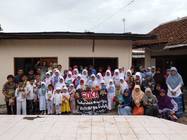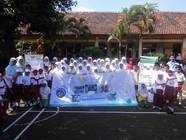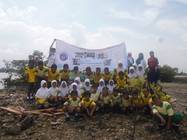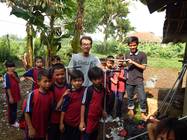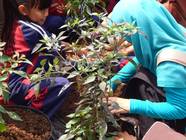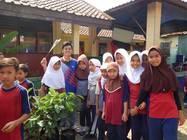Indonesia
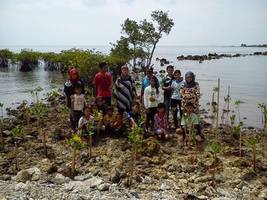
- IGaF participants planting 140 mangrove seedlings at Blebak Beach.
In 2013, YUNGA partnered with the Indonesian National Commission for UNESCO to train 40 teachers on biodiversity education using the Biodiversity Challenge Badge and Youth Guide to Biodiversity.
In 2014, YUNGA formed a partnership with the Indonesian Greenaction Forum (IGaF) who have to date run five projects in Jepara Regency: two in primary schools, two in secondary schools and another involving 90 students from the Students' Forum for Scientific Creativity.
“Sekolah Lingkungan & Pertanian” (Environmental and Agricultural School)
IGAF undertaking eco-projects related agriculture and similar themes of from the YUNGA Challenge Badges
IGAF Report: IGAF Exhibition Booth at the 3rd Preparatory Committee of HABITAT III Conference
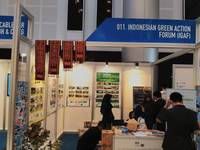
25-27 July 2016, Surabaya, Indonesia
According to HABITAT III Zero Draft Agenda Outcome 2016, by 2050 world urban human population will fetch approximately 70% which brings about the intensifying of social, economical, cultural, and ecological challenges and opportunities. Urban ecology, climate change,housing, infrastructure, basic services, food security, health, education, decent jobs, natural resources are one of the core discussions of urbanisation regards. As the result, the United Nations frame SDG 11: Sustainable Cities and Communities, and SDG 13: Climate Action to address these problems. The embodiment of SDG 11 in the term of New Urban Agenda (NUA) has been a new strategy addressing the aforementioned regards. In the Agenda, a wide range of actors – United Nations, nation states, city and regional leaders, civil societies, and so forth – will get together drafting an ultimate urban strategy and approaches for the next 20 years influencing national and international policies.
Urban ecology and climate change are two indispensable urban issues which is not only drafted at the New Urban Agenda but also these become an alarming threat in each cities in the world. For instance, Inevitably 70 percent of green house gas emission, 60 percent global energy consumption, and 70 percent global waste are ensued in cities. Mostly Indonesia cities– national and local government, and communities - has committed to accelerate urban ecology preservation programs and 29 percent carbon emissions reduction by 2030 (unconditional condition). In accordance with good willingness of Indonesia cities, the Indonesian Green Action Forum (IGAF) has endeavored to avail the cities through the IGAF Uban Eco-projects.
The IGAF Urban Eco-projects have been well-executed for 4 years with a total of 60 eco-projects under auspice of IGAF Partners, including UNESCO, YUNGA UNFAO, GEF Small Grants Programme UNDP, UNEP TUNZA SEAYEN and SAYEN, Tunza Eco-generation, SEAMEO BIOTROP, and UNESCO Sandwatch Foundation. To acquaint the IGAF Eco-projects widely, IGAF attempted to establish an exhibition booth at the 3rd Preparatory Committee (PrepCom3) of HABITAT III Conference held on 25th-27th July 2016 at Grand City Convex Surabaya, Indonesia. More than 193 countries attended PrepCom3 with a turnout of over 4000 attendees, and IGAF exhibition booth was mesmerizingly paid a visit by the attendees.
We acknowledge our partners:
1. YUNGA UNFAO, Italy
2. Barilla Center for Food and Nutrition, Italy
3. SEAMEO BIOTROP, Indonesia
4. Tunza Eco-generation, South Korea
5. UNEP TUNZA SEAYEN, Singapore
which aid to enliven the IGAF exhibition by means of their promotional goods. During the exhibition booth, there were several imperative program done which were: 1) IGAF Urban Eco-projects’ Launching, 2) Urban Farming Demo, and 3) Youth Manifesto Introduction. There were about 300 registered attendees who visited our booth and supported our projects.
Ending hunger and climate change via carbon farming schools
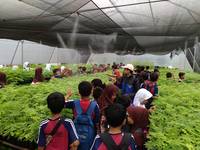
Carbon farming schools are one of the IGAF Eco-projects that were established to educate students (children and youths) and local communities on how to be aware of climate change and hunger issues. The marriage between farming and forestry is utilized to end hunger and address climate change. Agroforestry is one of the effective methods promoted in schools besides traditional education and other ecological activities. The schools are sponsored by the UNEP Eco-Peace Leadership Center, Yuhan Kimberly Ltd, YUNGA FAO and other institutions, which provide support with non-financial assistance (UNEP TUNZA SEAYEN, UNESCO, Sandwatch Foundation, Tunza Eco-generation).
For further information you can refer this following link: https://www.facebook.com/IndonesianGreenActionForum/
IGAF – Indonesian Green Action Forum
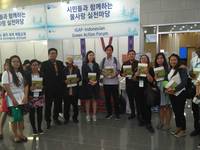
On 23 September 2017, The Indonesian Green Action Forum (IGAF), one of the youth-led organizations, which engages children, youths, and local communities to execute eco-projects for sustainable environment in Indonesia, organized a TIP Platform on Climate-Adapted Smart Water Technologies for Agriculture and Forestry.
In the platform, there were about 50-60 participants around the world, comprising academicians, country delegates, and societies. They discussed intensely about smart water technologies (solutions) for agriculture and forestry realm. Each speaker delivered about 15-20 minutes for presentation, and subsequently continued with discussion as well as Q&A session.
The first speaker was from Yooshin Engineering Corporation, Prof. Dr. Ick Hwan Ko, who delivered a speech about the smart water projects conducted at Citarum River, Bandung Indonesia. He and his team established some tools and analysis for controlling Citarum River from flooding. In addition, the tools used were beneficial for community based disaster management. The next speaker was Prof. Hakjun Rhee from Chungnam University. He presented smart water technologies used for forestry field, such as: watershed management based e-tools and other monitoring tools. The next speaker was Prof. Misook Lee who delivered a presentation about rural community development policy in South Korea, which was well-known as Semaul Undong. In her presentation, she explained the correlation between Semaul Undong with water management like well and irrigation management for water preservation. The last speaker was Prof. Seong Joon Kim from Konkuk University. He delivered well about the role of forest restoration for water preservation and climate change. He mentioned that hydrological behaviour must be controlled by three things, which were: reservoir release adaptation, maximum water level adaptation, and trans-evaporation date adaptation.
After the speakers’ presentation, they were invited to discuss with audiences or participants in Q&A session. At the first Q&A session, Mr. Achmad Solikhin proposed 4 questions to all panelists, which were as follows:
- Do you consider other factors which are considered beneficial to engage local communities in Indonesia as implementing your project at Citarum River? Most of Indonesian will be easily engaged as they obtain economic benefits over ecological gain.
- What kind of smart water management and road open improvement which will be used for watershed management?
- How South Korea deal with Semaul Undong with urban community development policy?
- Are there any tree species which are able to conserve hydrological system influencing climate change in South Korea?
The Indonesian Green Action Forum also held a booth session, entitled “Indonesia Water Cultures” in which this booth was attended by several national and international participants around the world. In this booth, the organizers were: Ms. Rima Shofyani, Mr. Kevin Alfianto, Mr. Danang Alfath, Ms. Mela Elmania, Ms. Hanitya Kaasih, Ms. Lolila Resti, and Mr. Tamyizul Muchtar. They brought a traditional performance in the booth with a unique appearance in the booth. In addition, some institutions also supported our booth, such as Barilla Center for Food and Nutrition, SEAMEO BIOTROP, YUNGA UNFAO, and K-Water.

